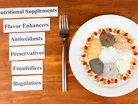Grocery Manufacturers Association Launches Program for Food Safety Transparency

There are few things that consumers want more these days than transparency and a better understanding of where their food comes from on its journey to grocery stores and restaurants. The Grocery Manufacturers Association (GMA) has taken note of this, and aims to deliver: this week the Washington DC-based trade association announced the launch of a five-part initiative increase traceability and build consumer trust toward common additives and ingredients used in food manufacturing.
That initiative focuses on ingredients determined to be Generally Recognized as Safe (GRAS). As the Wall Street Journal points out, GRAS products do not generally require FDA approval, so long as the company that produces the product vouches for its safety. Despite the GRAS title, many modern consumers feel a growing unease at the lack of general public knowledge about exactly how safe these additives actually are. It’s that unease that the GMA and its food manufacturing constituents are trying to alleviate through an increase in transparency.
“Our industry is committed to providing consumers with safe, quality, affordable and innovative products," said Dr. Leon Bruner, Chief Science Officer for GMA, in a statement issued to the media on Wednesday. "In the spirit of that ongoing commitment, today we are launching a modernization initiative that will improve the process and increase transparency for making Generally Recognized As Safe (GRAS) determinations of ingredients added to food."
According to this release, this five-part initiative will start with defining and documenting a Publicly Available Standard (PAS) for conducting transparent and traceable assessments of a given ingredient’s safety. From there, the trade association has plans to expand these standards through such measures as:
- Creating expanded education and training programs to provide scientists and inspectors with the tools they need to assess a product’s GRAS status;
- Creating a community outreach program to elevate awareness and understanding of standardized procedures to assess ingredient safety, and;
- Creating and maintaining a database for GMA members to confirm that they are adhering to GRAS standards and that their employees are fully trained in GRAS safety assessment procedures.
The GMA also plans to work with the Center for Research and Ingredient Safety (CRIS) at Michigan State University, which the association helped to establish, utilizing the Center as a third party expert source for ingredient analysis. In total, the GMA is hoping that these measures will inspire consumer confidence in the safety of their food products, paving the way for further innovations and
“GRAS determinations of ingredients added to food are but one of many important procedures the industry uses to provide consumers with the safe, quality and innovative product choices they demand,” Dr. Bruner added in the release. “We are confident that this initiative along with the industry’s efforts to implement the Food Safety Modernization Act will strengthen the food safety programs used by the entire food industry and thereby provide consumers more assurance that food products produced by US manufacturers are and will remain the safest available in the world.”
[SOURCE: Grocery Manufacturers Association; The Wall Street Journal]
- Starbucks to use blockchain to make coffee transparent from 'bean to cup'Drink
- Cargill is using blockchain technology to trace turkeys from farm to tableFood
- Grocery Manufacturers Association responds to WHO report linking processed meat to cancerFood
- Grocery Manufacturers Association Challenges Vermonts GMO Labeling LawFood



